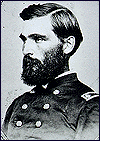|
|
|
| ||
|
PART 2: The Treatment of Black Troops; The War Ends
Both within the war zone and back home in Red Wing, members of the Densmore family worried about what would happen if the brothers got caught by rebel troops while in command of former slaves. The Confederate government warned that captured black soldiers and their commissioned officers would not be protected by the laws of war - they were to be punished, and possibly executed, as outlaws. This policy was seen by many as an open invitation to battlefield atrocity.12 With good reason. On April 12, 1864, Confederate riders under Forrest's command attacked and swarmed Fort Pillow, Tennessee. Half the Union troops there were black. Some 300 soldiers were slain after dropping their arms in surrender (Forrest would later help found the Ku Klux Klan). The Fort Pillow massacre made national news, terrifying and outraging all connected with the Union's colored troops. Benjamin Densmore's men strengthened their trenches and bulwarks at Fort Halleck, Kentucky because of the "inhuman treatment" of Union forces by Confederates at Fort Pillow. Daniel said the new motto of the 68th was "Remember Fort Pillow."13 Writing from his desk in Red Wing, father Orrin Densmore fretted about the swelling size of Robert E. Lee's army. He feared that Benjamin's regiment might feel the "intensified hatred and cruelty of rebel demons." The recent treatment of prisoners at Fort Pillow does not offer many flattering inducements to enter the "colored service," and until the policy of the administration upon that subject is developed by actual and active measures to ensure the treatment of colored soldiers and their white officers according to the rules of war, I should not advise trusting that branch. "A live dog is better than a dead lion," the scriptures say.14 The youngest Densmore, 16-year-old Orrin Jr., predicted that the rebels "would murder all those having anything to do with Negroes." In a youthfully blunt afterthought he asked Daniel, "If Benjamin should be killed I don't think there would be any objection to my going [into the army], do you?" Orrin was never called to duty under this, or any other, contingency.15 Benjamin's regiment mainly served garrison duty.16 THE WAR ENDS In the field, Benjamin and Daniel Densmore grew cynical about the corruption, incompetence and prejudice they saw in the Union army. White soldiers blanched at the perceived indignity of fighting alongside blacks, so most black troops were limited to performing manual labor. Early in the war, black fighters got paid less than their white counterparts. Black troops were often issued the worst materiel that the Union quartermaster had to offer. When Benjamin Densmore's 4th U.S. Colored Heavy Artillery received its guns, the weapons needed extensive repair just to make them usable. At Memphis, Daniel complained that the death rate among his men was "frightful" because of the shoddy tents they lived in. Daniel Densmore said the heavy work increased his soldiers' vulnerability to disease, and that "for a nigger, sickness is death." Daniel reported bitterly that his men were obliged to perform so much fatigue duty that officers like himself, trained in the arts of war, were reduced to little more than "nigger drivers." Daniel protested to higher authority but was ignored.17 The Confederacy surrendered in April, 1865. Benjamin and Daniel Densmore served well into 1866. During Reconstruction, the army had to figure out what to do with more than 186,000 colored troops who were trained to dig trenches and fire rifles, but who were not prepared for post-war freedoms. Writing home one month after Lee's surrender at Appomattox, Benjamin Densmore asked if his family knew of anyone qualified to teach his troops basic reading and writing. The money would come from the soldiers' pay. Densmore had already used $16 found in a dead soldier's coat to buy alphabet cards, pencils and tablets for his men. The time might come when they will be thrown upon their own resources. The event of their being invested with the rights of franchise and citizenship is of no remote possibility. It is part of Christianity to use every effort to prepare them for these responsibilities. The work cannot be completed but it can be commenced, at least.18 It's unclear whether Captain Benjamin Densmore found a teacher before receiving his honorable discharge from the 4th Colored Heavy Artillery in February, 1866. After the war, Benjamin Densmore and most other Americans quickly set about building a post-war life. The Densmore brothers returned to Red Wing and bought a foundry. The Red Wing Iron Works building still stands near the Mississippi in downtown Red Wing. Benjamin married Sarah Adalaide Greenland of Red Wing and moved into a remodeled schoolhouse, where all four of their children were born. Twenty-six years later, Densmore was prosperous enough to send his children to college and to build a comfortable house on the corner of Third and Fulton Streets. After 46 years at the foundry, Benjamin and Daniel Densmore retired. Benjamin died of pneumonia in January 1913. Daniel and his wife retired to California, where he died in 1915.
Part 1: Frances' Father and Uncle Enlist for the Union; Command "Colored Troops"
NOTES
| ||||

